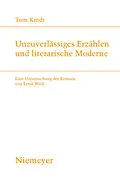The book examines the work of the Austrian Jewish writer Ernst Weiss (1882-1940), which has only recently been regaining the recognition it was accorded in the inter-war years. A critical study of Weiss' most important texts, from his first novel Die Galeere [The Galley] (1913) through to his novel Der Augenzeuge [The Eye-Witness] written in exile in 1939 gives an overview of the development of his complete works, of its guiding ideas, striking changes of direction, central influences and position in the history of literature.
Tom Kindt , Georg-August-Universität Göttingen.
The book examines the work of the Austrian Jewish writer Ernst Weiss (18821940), which has only recently been regaining the recognition it was accorded in the inter-war years. A critical study of Weiss' most important texts, from his first novel Die Galeere [The Galley] (1913) through to his novel Der Augenzeuge [The Eye-Witness] written in exile in 1939 gives an overview of the development of his complete works, of its guiding ideas, striking changes of direction, central influences and position in the history of literature.
Autorentext
Tom Kindt, Georg-August-Universität Göttingen.
Inhalt
1;Frontmatter;1
2;Inhaltsverzeichnis;5
3;Einleitung Ich-Roman und literarische Moderne;7
4;Teil 1 Der Autor im Text. Vorbemerkungen zur Methode;13
5;Teil 2 Auf dem Weg zum Ich-Roman. Die Evolution des Werks von 'Die Galeere' bis zu 'Männer in der Nacht';74
6;Teil 3 Georg Letham und seine Brüder. Die Konzeption der Ich-Romane von 'Der Aristokrat' bis zu 'Der Augenzeuge';151
7;Backmatter;223
Titel
Unzuverlässiges Erzählen und literarische Moderne
Untertitel
Eine Untersuchung der Romane von Ernst Weiß
Autor
EAN
9783484970328
ISBN
978-3-484-97032-8
Format
E-Book (pdf)
Hersteller
Herausgeber
Veröffentlichung
27.08.2008
Digitaler Kopierschutz
Wasserzeichen
Dateigrösse
1.08 MB
Anzahl Seiten
248
Jahr
2008
Untertitel
Deutsch
Lesemotiv
Unerwartete Verzögerung
Ups, ein Fehler ist aufgetreten. Bitte versuchen Sie es später noch einmal.
